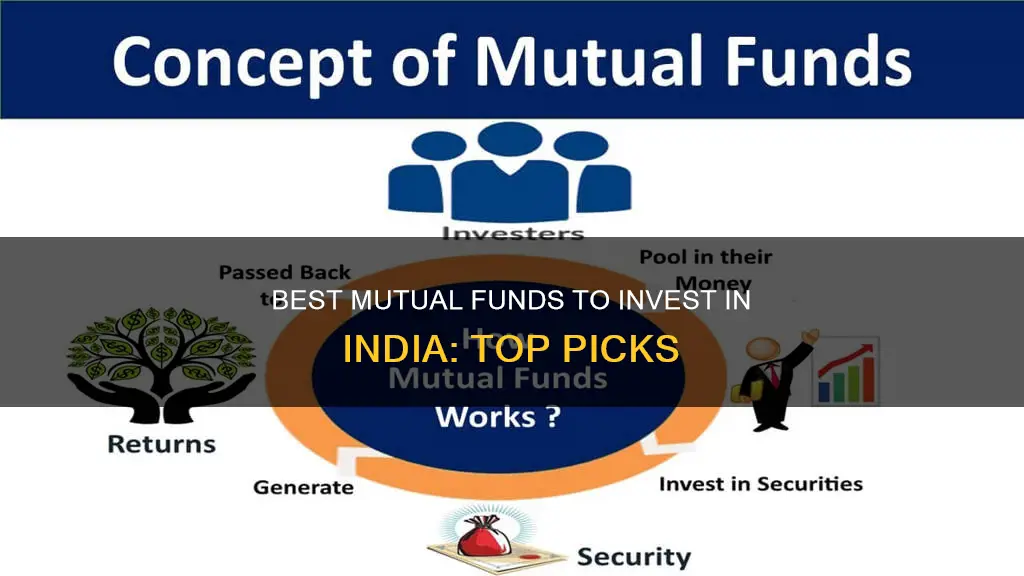
There are thousands of mutual funds in India, and selecting the best ones to invest in is not easy. It is important to consider your risk profile and the time horizon of your goals. If you are looking for high returns, you can invest in high-risk funds for your long-term goals. Conversely, if you have a low-risk appetite, you can opt for low-risk funds to achieve your short-term goals. Mutual funds are classified into different categories based on the asset class they invest in, such as equity funds, debt funds, and hybrid funds. When choosing a mutual fund, it is essential to analyse the fund's history, the performance of the fund manager, expense ratios, and investment objectives.
| Characteristics | Values |
|---|---|
| Investment Objectives | Wealth creation, retirement corpus, tax savings, etc. |
| Fund's History | A long track record of delivering consistent returns over different market cycles |
| Expense Ratio | Low expense ratio compared to peers |
| Fund Manager's Performance | Good track record, especially during market corrections |
| Consistency of the Fund | Outperformed the market over the long term, typically 3-5 years |
| Financial Ratios | High Sharpe and Alpha ratios |
| Taxation | Tax benefits under Section 80C of the Income Tax Act, 1961 |
| Risk | Varies across types, with equity funds carrying the highest risk |
What You'll Learn

Best equity mutual funds
Equity mutual funds are a type of mutual fund that invests in the stock market. These funds are suitable for investors who are comfortable with a moderate to high level of risk and are looking for higher returns. Here are some of the best equity mutual funds in India:
Motilal Oswal Midcap Fund
This fund has consistently delivered strong returns, with 38.54% annualised returns over the past three years and 34.38% over the last five years. The minimum investment amount is ₹500 via lump sum and ₹500 via SIP.
Invesco India Infrastructure Fund
With annualised returns of 33.46% over three years and 34.42% over five years, this fund has a strong track record. The minimum investment amount is ₹1,000 for lump sum investments and ₹500 for SIP.
Kotak Infrastructure and Economic Reform Fund
This fund has generated annualised returns of 33.44% in the past three years and 31.32% in the last five years. It has a minimum investment amount of ₹100 for lump sum and ₹100 for SIP.
Nippon India Small Cap Fund
The Nippon India Small Cap Fund has delivered 32.28% annualised returns in the last three years and 38.06% in the previous five years. The minimum investment amount is ₹5,000 for lump sum and ₹100 for SIP.
HDFC Focused 30 Fund
This fund has provided investors with 30.27% annualised returns over three years and 25.88% over five years. It has a low minimum investment amount of ₹100, regardless of whether you choose lump sum or SIP.
JM Flexicap Fund
The JM Flexicap Fund is another strong performer, with 29.48% annualised returns over three years and 27.48% over five years. The minimum investment amount is ₹1,000 for lump sum and ₹100 for SIP.
When investing in equity mutual funds, it is important to consider your financial goals, risk tolerance, and investment horizon. These funds can be volatile in the short term, so it is generally recommended to stay invested for at least five years.
Vanguard Funds: Best Investment Options for Now
You may want to see also

Best debt mutual funds
Debt mutual funds are a type of mutual fund that generates returns by lending money to the government and companies. The lending duration and the type of borrower determine the risk level of a debt fund. Debt funds are considered to be the least risky type of mutual fund, making them ideal for investors seeking regular income and conservative or first-time investors. They can also be a good option for those looking for better returns than traditional savings products, such as fixed deposits.
When choosing a debt fund to invest in, it is important to consider factors such as taxes, investment tenure, and the fund's history and performance. Here are some of the best debt mutual funds in India:
- Aditya Birla Sun Life Medium Term Plan Fund
- Aditya Birla Sun Life Medium Term Fund
- UTI Medium to Long Duration Fund
- HDFC Regular Savings Fund
- ICICI Prudential Dynamic Bond Fund
- Aditya Birla Sun Life Dynamic Bond Retail Fund
- Sundaram Low Duration Fund
- Sundaram Short Duration Fund
- SBI Magnum Gilt Fund
- UTI Short Duration Fund
- ICICI Prudential All Seasons Bond Fund
- UTI Low Duration Fund
- UTI Ultra Short Duration Fund
- ICICI Prudential Gilt Fund
- Nippon India Ultra Short Duration Fund
- JM Dynamic Bond Fund
- LIC MF Gilt Fund
- Sundaram Banking & PSU Fund
- LIC MF Short Duration Fund
- Nippon India Income Fund
- Aditya Birla Sun Life Corporate Bond Fund
- Aditya Birla Sun Life Banking & PSU Debt Fund
- Canara Robeco Corporate Bond Fund
- Baroda BNP Paribas Dynamic Bond Fund
- Bandhan Dynamic Bond Fund
- Franklin India Government Securities Fund
- HSBC Medium Duration Fund
- Invesco India Credit Risk Fund
- UTI Credit Risk Fund
- Canara Robeco Liquid Fund
- Union Medium Duration Fund
- Quantum Liquid Fund
- Parag Parikh Liquid Fund
- Motilal Oswal Liquid Fund
- Aditya Birla Sun Life Floating Rate Fund
- ICICI Prudential Corporate Bond Fund
- Canara Robeco Savings Fund
- DSP Low Duration Fund
- ICICI Prudential Banking & PSU Debt Fund
These funds have been recommended by various sources as top-performing debt mutual funds in India. However, it is important to note that past performance does not guarantee future results, and investors should carefully consider their financial goals, risk tolerance, and investment horizon before investing.
Index Funds vs Roth IRA: Where Should You Invest?
You may want to see also

Best hybrid mutual funds
Hybrid mutual funds are a good option for investors looking for a diversified portfolio with a mix of asset classes such as equity, debt, gold, and international equities. These funds are suitable for conservative and aggressive investors as they come in various combinations of risks, asset allocations, capital appreciation, and diversification.
ICICI Prudential Equity & Debt Fund
This fund has offered consistent returns over the past three and five years, with 23.43% and 25.05% annualised returns, respectively. It is ranked #1 in the aggressive hybrid fund category. The minimum investment amount is ₹5,000 for lump-sum investment and ₹100 for SIP.
JM Aggressive Hybrid Fund
This fund has delivered 24% and 27.86% annualised returns in the past three and five years, respectively. It falls under the hybrid category of JM Financial Mutual Funds. The minimum investment amount is ₹1,000 for lump-sum investment and ₹100 for SIP.
HDFC Balanced Advantage Fund
With 24.42% and 22.35% annualised returns in the past three and five years, respectively, this fund is ranked #6 in the dynamic asset allocation category. The minimum investment amount is ₹100 for both lump-sum and SIP investments.
Edelweiss Aggressive Hybrid Fund
The Edelweiss Aggressive Hybrid Fund is ranked #4 in the aggressive hybrid fund category. It has provided 21.54% and 22.19% annualised returns over the last three and five years, respectively. The minimum investment amount is ₹100 for lump-sum investment and ₹100 for SIP.
Quant Multi Asset Fund
This fund is ranked #1 in the multi-asset allocation category. It has generated 26.14% annualised returns in the past three years and 31.32% in the last five years. The minimum investment amount is ₹5,000 for lump-sum investment and ₹1,000 for SIP.
When investing in hybrid mutual funds, it is essential to consider factors such as investment objectives, fund history, expense ratio, fund manager's performance, consistency of the fund, and financial ratios. Additionally, these funds carry market risks, interest rate risks, and credit risks.
Funding Sources for Your Real Estate Investment
You may want to see also

Best tax-saving mutual funds
When it comes to investing in mutual funds, there are a plethora of options available in India. However, there is no one-size-fits-all approach, and the best mutual fund for an individual depends on their investment objectives, risk tolerance, and investment horizon.
With that being said, here is a list of some of the best tax-saving mutual funds in India:
ELSS Mutual Funds:
ELSS (Equity-Linked Savings Scheme) funds are a type of equity fund that offers tax benefits under Section 80C of the Income Tax Act, 1961. These funds have a lock-in period of 3 years, which is the shortest among all tax-saving investment options. Here are some top-performing ELSS funds:
- SBI Long Term Equity Fund
- Quant ELSS Tax Saver Fund
- Motilal Oswal ELSS Tax Saver Fund
- HDFC ELSS Tax Saver Fund
- Bank of India ELSS Tax Saver Fund
- Parag Parikh ELSS Tax Saver Fund
- ICICI Prudential ELSS Tax Saver Fund
Arbitrage Mutual Funds:
Arbitrage mutual funds are another option for tax-saving investments. These funds take advantage of price differences between two markets, typically the cash and derivatives markets. Arbitrage funds are considered equity funds for taxation purposes, and gains are taxed at 15% for short-term holdings (less than 1 year) and 10% for long-term holdings (more than 1 year) above ₹1 lakh. Here are some top-performing arbitrage funds:
- JM Aggressive Hybrid Fund
- ICICI Prudential Equity & Debt Fund
- HDFC Balanced Advantage Fund
- ICICI Prudential Multi Asset Fund
- Edelweiss Aggressive Hybrid Fund
Infrastructure Mutual Funds:
Infrastructure mutual funds invest in companies related to infrastructure development, such as construction, power, and engineering. These funds offer tax benefits under Section 80C. Here are some top-performing infrastructure funds:
- Bandhan Infrastructure Fund
- ICICI Prudential Infrastructure Fund
- Invesco India Infrastructure Fund
- Franklin Build India Fund
- Canara Robeco Infrastructure Fund
It is important to note that the performance of mutual funds can vary over time, and past performance does not guarantee future results. Individuals should carefully consider their investment objectives, risk tolerance, and financial situation before investing.
Hedge Fund Memos: Where to Access and Read
You may want to see also

Best small-cap mutual funds
When considering the best small-cap mutual funds to invest in, it is important to assess your risk profile and the time horizon of your goals. Small-cap funds are a type of equity fund that invests in small companies with a market capitalisation of less than Rs. 5,000 crores in India. These funds can deliver fantastic returns but are incredibly volatile, making them ideal for aggressive investors with a long-term investment horizon. Here are some of the top-performing small-cap mutual funds in India:
Nippon India Small Cap Fund
This fund has consistently delivered strong returns, with a 5-year annualised return of 38.41% and a 10-year annualised return of 29.82%. It has an excellent track record of outperforming its peers and benchmarks.
Bank of India Small Cap Fund
The Bank of India Small Cap Fund is another top-performing fund in the small-cap category. It has generated impressive returns, with a 5-year annualised return of 40.21%. The fund has no track record, but its performance has been impressive in the short term.
Invesco India Smallcap Fund
With a 5-year annualised return of 35.37%, the Invesco India Smallcap Fund is another strong contender in the small-cap space. While it does not have a long track record, its performance has been consistent, and it has outperformed the market during volatile periods.
Edelweiss Small Cap Fund
The Edelweiss Small Cap Fund has delivered solid returns, with a 5-year annualised return of 35.98%. This fund has no long-term track record, but its short-term performance has been impressive, outperforming its peers and benchmarks.
Franklin India Smaller Companies Fund
With a 5-year annualised return of 31.37%, the Franklin India Smaller Companies Fund is another reputable small-cap fund. While it may not have the highest returns compared to its peers, it has consistently delivered positive performance over the years.
When selecting a small-cap mutual fund, it is crucial to assess your risk tolerance and investment objectives. These funds are suitable for investors with a high-risk appetite and a long-term investment horizon. Additionally, consider the fund's history, expense ratio, and the fund manager's track record when making your decision.
Hedge Fund Investment Strategies: Where and How They Invest
You may want to see also
Frequently asked questions
ELSS (Tax saving schemes) and Aggressive Hybrid Funds (can invest 65-80% in equities) are good options for beginners.
High-potential Small & Mid Cap Funds offer high returns by investing in risky yet promising stocks.
You can invest in the best SIP mutual fund to make your investment goals a reality. You can start investing in mutual funds through SIP with as little as Rs.100 per month.







